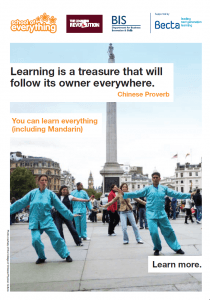A few posts I read this morning seem to complement each other by showing how inadequate the current political and economic climate (pardon the pun) is for meeting the targets set out in the UK’s Climate Change Act 2008.
It’s not unusual to find reports calling for the need to tackle climate change with the kind of national attention and effort that was mobilised around World War II. A good example is a recent report from the The Royal Academy of Engineering, Generating the Future. A report on UK energy systems fit for 2050. I’ll have more to say about the report in another post, but they join the chorus of experts referring to the Act as “a huge challenge”, arguing that nothing less than our entire manufacturing base needs to shift focus and be “on a war footing”, if we are to meet the targets set out in the Act.
Last night, Ed Milliband was challenged during the Guardian’s Climate Debate over Roger Pielke Jnr. paper which argues that to meet the Climate Change Act’s targets for decarbonisation, the equivalent of 30 nuclear power stations would have to be built before 2015. Pielke’s position is that the Climate Change Act was always doomed to fail and that Milliband or whoever succeeds him will have to face up to it sooner or later.
So given the “huge challenge” (or delusion if you agree with Pielke Jnr.), what would it mean to be “on a war footing” in order to address the targets set out in the Act?
In a post yesterday, Stuart Staniford (one of my favourite energy/environment blogger analysts), notes that in 1943, the UK was spending 55% of GDP on the war. His source, the Cambridge Economic History of Great Britain, states that UK expenditure on the war went from 7% of GDP in 1938, to 53% in 1941, to 55% in 1943. So, in economic terms, that is what being “on a war footing” means. Half of national productivity is mobilised towards a single goal.
However, again in yesterday’s news we find that the UK’s annual deficit is the highest since records began in 1946, or as Edmund Conway in The Telegraph puts it this morning, we’re already experiencing a “war-sized” annual public deficit (overdraft) of £163.4bn (or 11.5% of GDP). Perhaps we should take some comfort in the Guardian’s Data Blog which shows that public debt (the accumulation of deficits) currently stands at 63.6% of GDP, far from the 250% of 1946.
This would suggest that if we are to shift our entire manufacturing base towards decarbonisation, as The Royal Academy of Engineering thinks we should, then Ann Pettiford’s argument for mobilising (I guess that includes educating/training) a “‘carbon army’ of ‘green-collar’ jobs”, through additional borrowing would seem to fit quite nicely into this apparently necessary vision of a ‘war on carbon’ (my phrase). For people working in education, it might be a useful exercise to consider what tertiary education might look like if half of national productivity was directed towards meeting the Climate Change Act, a law that each of us in the UK is bound too, after all.
The problem I have with all of this talk of war and climate change, aside from the hot air and inaction, is along the lines of what George Monbiot, in his book, Heat, has to say on the matter. That is, the enemy is no other than ourselves.
Most environmentalists – and I include myself in this – are hypocrites … I would like to believe that the changes I suggest could be achieved by appealing to people to restrain themselves. But though some environmentalists, undismayed by the failure of the past forty years of campaigning, refuse to see it, self-enforced abstinence alone is a waste of time . . . I have sought to demonstrate that the necessary reduction in carbon emissions is – if difficult – technically and economically possible. I have not demonstrated that it is politically possible. There is a reason for this. It is not up to me to do so. It is up to you . . . The campaign against climate change is an odd one. Unlike almost all the public protests which have preceded it, it is a campaign not for abundance but for austerity. It is a campaign not for more freedom but for less. Strangest of all, it is a campaign not just against other people, but also against ourselves.
I would add though that the enemy is not simply ‘ourselves’ – you, me, us – but capital’s laws of motion that have been turning since the late seventeenth century. We might find some comfort in reading that there is nothing natural about these laws of motion – there are alternatives – yet in another post I read this morning, it looks like the enemy has already won.
